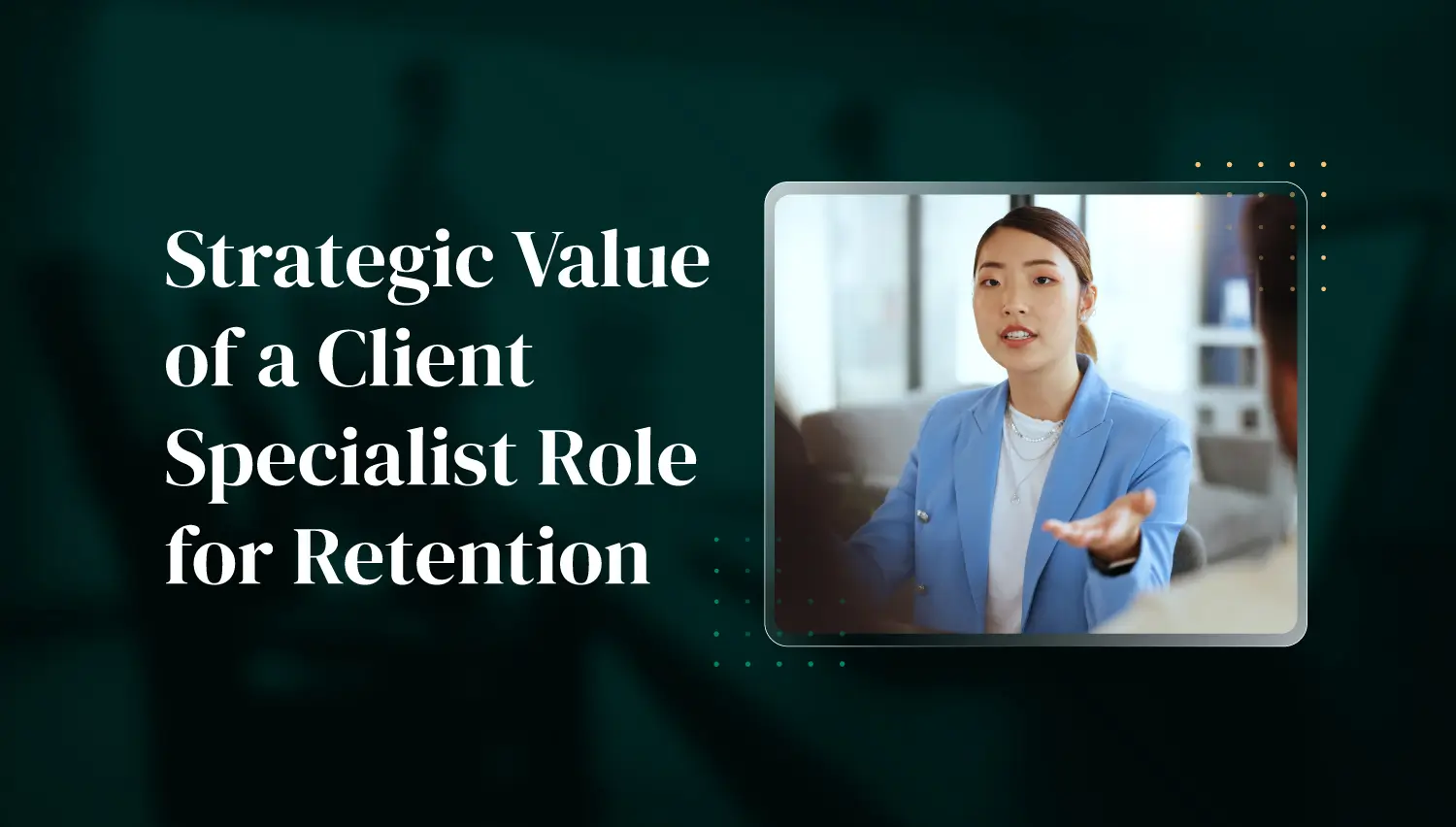At a B2B SaaS company I worked with, we signed a $400K ARR healthcare client with a long list of compliance and onboarding requirements. The deal closed fast, and pressure to deliver ramped up even faster. We threw everything we had at implementation, sales ran the kickoff, product handled the integration, support fielded tickets, but no one was managing the overall relationship. Within six weeks, the client was frustrated. Milestones were missed, updates were inconsistent, and internally, no one felt fully accountable.
That's when I pushed to hire a dedicated Client Specialist.
We didn't have the role in place yet, but it was obvious we needed someone to own the relationship. Someone client-facing, but operationally sharp enough to manage the internal chaos too. Within two weeks, we brought in a candidate I'd worked with before: calm under pressure, detail-obsessed, and fluent in translating between teams and clients.
She immediately restructured how we communicated: set up weekly executive syncs, created a shared implementation tracker, and assigned clear ownership on our side for every open issue. Just as importantly, she started listening in a way no one else had been. The client didn't just feel heard; they started re-engaging. By the end of the quarter, they'd renewed and referred two new prospects.
That's what a Client Specialist does: not just handle problems, but build trust that keeps business growing.
What Does a Client Specialist Actually Do?
A Client Specialist sits at the intersection of service, retention, and growth. They're not support reps, and they're not account managers. They're the connective tissue between your internal teams and the client's evolving needs.
At its core, the role is about ownership. A good Client Specialist is the single, consistent point of contact for clients post-sale. They manage onboarding follow-through, coordinate internal teams to resolve issues, track account health, and proactively surface risks before they escalate. They ensure that the client never feels like they're navigating your company blind.
In high-growth or high-complexity environments, this kind of relationship management is more than just helpful; it's essential. Clients expect responsiveness, but they also expect continuity. They want someone who understands their context, not just their latest ticket.
If you're seeing signs of churn, misalignment, or friction between your product and your clients' expectations, the Client Specialist might be the role you didn't realize you were missing.
Why Client Specialists Matter More Than Ever
Client expectations have changed. It's no longer enough to offer a great product and a responsive support team. Businesses are expected to deliver a seamless, proactive experience across the entire post-sale journey. That's where the Client Specialist comes in.
In many cases, churn isn't driven by a broken product; it's driven by a breakdown in communication or trust. When updates are inconsistent, ownership is unclear, or feedback disappears into a void, clients start to disengage. And once that relationship frays, even the best product can struggle to retain them.
A Client Specialist solves that by becoming the constant. They're looped into strategic conversations, track progress across teams, and keep the client relationship aligned with internal delivery. They aren't reactive. They're relationship operators.
I've seen companies pour money into growth while quietly losing long-term clients simply because no one was clearly responsible for relationship health. In every case, inserting a dedicated Client Specialist changed the trajectory. Retention improved. Expansion became easier. Clients started treating us like partners (not just vendors).
This role isn't overhead; it's infrastructure for trust.

How to Get the Most Value from Your Client Specialist
Define the Scope of the Role
One of the biggest mistakes I see is companies assigning vague responsibilities to their Client Specialists, expecting them to "manage relationships" without any structure. That leads to overlap with account managers, confusion with support, and frustration on all sides.
Define exactly what this role owns. Common responsibilities include:
- Acting as the primary post-sale point of contact
- Managing onboarding follow-through and delivery timelines
- Coordinating internal teams across product, support, and ops
- Monitoring account health and usage signals
- Escalating risks before they become churn
- Capturing client feedback and closing the loop internally
The more clearly you define ownership, the more effectively the role can operate.
Hire for the Right Skills and Traits
The Client Specialist role requires a unique blend of emotional intelligence and operational rigor, so a generic customer service experience won't cut it.
- Empathetic and proactive in communication
- Detail-oriented and organized under pressure
- Confident in navigating technical or operational complexity
- Fluent with CRM tools and client-facing platforms
- Comfortable holding both internal teams and clients accountable
A strong Client Specialist isn't just client-friendly; they're operationally competent and process-driven.
Integrate with Sales, Support, and Ops
A Client Specialist is only effective when they have real connectivity to the teams responsible for delivery, communication, and product direction.
- Sales for context on original commitments and upsell timing
- Support for handling escalations and ticket trends
- Product for roadmap alignment and feedback loops
- Operations for delivery timelines and capacity planning
Define communication paths and escalation frameworks. If this role doesn't have direct lines to other teams, it will default to triage instead of leadership.
Track Metrics That Show Real Value
The impact of a Client Specialist can (and should) be tracked. This isn't a soft-skill role; it has measurable outcomes that tie directly to client satisfaction and revenue stability. Focus on metrics like:
- Client retention and renewal rates
- Client satisfaction or NPS
- Volume and resolution time of escalations
- Onboarding timeline adherence
- Expansion revenue sourced from existing accounts
- Product adoption or feature usage improvements
These metrics show whether the role is helping clients succeed and whether your team is building the right kind of trust.
Key Factors to Consider When Hiring for This Role
Even once you've recognized the need for a Client Specialist, getting the hire right requires more than just a job description. It's a role that sits between support, product, and customer success, so context matters. Here's what to think about before you make the hire.
When It's Time to Hire
If your client experience is starting to fray, this role can stabilize it, but the earlier you bring one in, the more effective they'll be. Some of the most common signals include:
- Clients asking for a consistent point of contact
- Delays or confusion during onboarding
- Internal teams unclear on who owns the relationship
- Churn creeping up in mid-tier or high-potential accounts
When those issues show up, they often point to the same root cause: no one is managing the relationship as a whole.
Match the Experience Level to Account Complexity
The Client Specialist role can flex based on your client base. In lower-complexity environments, a junior hire may be enough to coordinate touchpoints and maintain momentum. But for high-value accounts or industries with more operational complexity, you'll need someone more senior. Someone who can navigate internal politics, flag risks early, and speak credibly to executive-level stakeholders.
When in doubt, tier the role. Not every client needs your most experienced relationship lead, but every client needs someone equipped to handle their context.

Prep the Tools and Processes Beforehand
Even the best hire will underperform if you drop them into chaos. Before onboarding someone into this role, make sure the fundamentals are in place:
- Clear access to CRM and documentation
- Defined processes for internal coordination
- Working templates for onboarding, check-ins, and escalation
- Visibility into client health metrics and historical data
The Client Specialist doesn't just manage relationships; they manage movement across systems. Give them a clean runway.
Don't Overlook Culture and Communication Fit
This role acts as the client's internal advocate and your brand's external voice. That makes alignment on tone, values, and professionalism non-negotiable. In hiring, look for candidates who:
- Communicate clearly under pressure
- Show curiosity about how your product works
- Understand the balance between client empathy and internal accountability
The right person won't just reduce churn, they'll help your clients feel like they're working with someone who genuinely gets them.
How to Avoid Common Client Specialist Pitfalls
Hiring a Client Specialist is a smart move, but mishandling the role is easy if you treat it like a catch-all. Without clarity, access, and internal alignment, the person in the seat ends up firefighting rather than delivering value. Here's where things most often go wrong and how to avoid them.
Don't Confuse Them with Support
One of the fastest ways to undermine a Client Specialist is to treat them like a support buffer. If they're only pulled in when something breaks, or worse, tasked with solving problems they don't own, they'll struggle to build trust on either side.
Make sure clients know the difference. Support solves specific issues. The Client Specialist owns the relationship (progress, sentiment, and alignment).
Involve Them in Strategic Conversations
Client Specialists need a seat at the table. If roadmap planning, renewal strategy, or escalation decisions happen without their input, you lose the benefit of their context. They're closest to the client's actual experience and often the first to notice when sentiment shifts.
Keep them looped in. Their visibility isn't just nice to have; it's an early-warning system for churn.
Remove Critical Access Bottlenecks
Client Specialists work cross-functionally by design, but that only works if they can move quickly inside the organization. When they're stuck chasing updates across disconnected teams or navigating unclear chains of command, progress stalls, and clients notice.
Give them direct lines. Assign clear owners for common blockers. If your internal organization is a maze, the specialist can't lead with confidence.
Avoid Viewing Them as a Silver Bullet
Because the Client Specialist touches so many parts of the client experience, it's easy for teams to start routing everything their way (billing issues, product bugs, project delays). But the more miscellaneous tasks they absorb, the less time they have to actually manage the relationship.
Set guardrails. Define what they own and what they don't. If everything defaults to them, the role becomes reactive and unsustainable, exactly what it's meant to prevent.
Get Help Finding a Great Client Specialist
The value of this role is clear, but sourcing the right person isn't always straightforward. You need someone with client-facing presence, internal coordination skills, and the judgment to navigate complex accounts. That kind of hire takes time, and the cost of getting it wrong is high.
That's where recruitment partners like Somewhere come in.
We specialize in helping companies build high-performing client service functions by identifying talent that fits both the role and the operating environment. Whether you need someone to manage a few strategic accounts or structure your entire client success layer, they'll help you move fast and hire with confidence.
If you're ready to strengthen retention, improve account health, and scale trust across your book of business, fill out the contact form below. The right Client Specialist could be your most cost-effective hire this year.








.jpeg)





